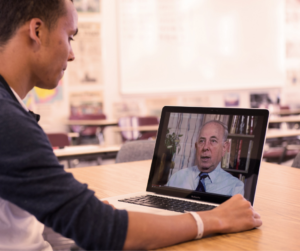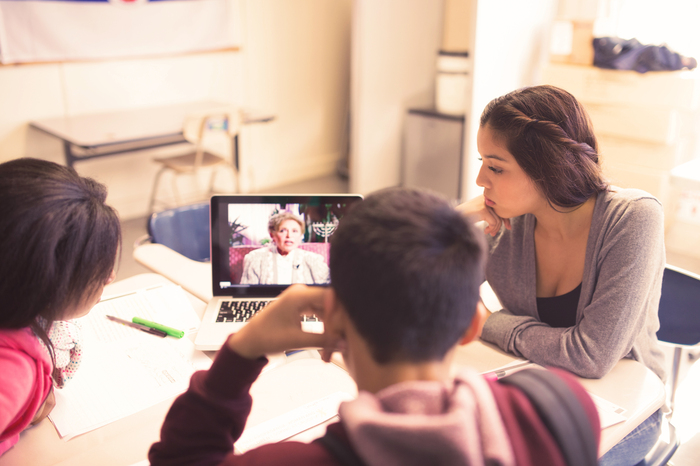
CLASSROOM LESSONS
TEACHING

 As teachers, we craft our lessons to highlight fundamental facts in a way that will emotionally resonate with our students long after they have left our class. There is something gratifying about watching students realize you have threaded this needle intentionally, emphasizing a theme like resistance during the Holocaust, for example.
As teachers, we craft our lessons to highlight fundamental facts in a way that will emotionally resonate with our students long after they have left our class. There is something gratifying about watching students realize you have threaded this needle intentionally, emphasizing a theme like resistance during the Holocaust, for example.
What do we hope students learn from a study of the Holocaust? Why should we teach this important human event? How we answer these questions guide our curriculum development, craft our lessons, and are fundamental to the impact of Holocaust education.
The Holocaust is not a metaphor to be used to make connections but a historical fact that must be understood in its own unique circumstances and context as a truly unprecedented event.
Studying the Holocaust is not just about the facts and figures, however, but also about the lessons, ethics, and values that are obtained from its exploration. A recent survey from Echoes & Reflections found that college students who had Holocaust education in high school were more likely to be empathetic, more open-minded, and scored higher in critical thinking, civic efficacy, and social responsibility—if they watched survivor testimony as part of their experience. This shouldn’t, and didn’t, come as a surprise to those who dedicate their lives to effective Holocaust education.
We often perceive historical learning as defined by either students’ ability to remember facts, dates, and figures, or their transformation into responsible citizenry. We often view these two rationales as competing factions, but they are most effective when taught concurrently. By focusing on social-emotional learning (SEL), students grow in their emotional maturity and intellectual capacity. Conceptually, we know students learn better when they are confident, are in a supportive learning environment, and are encouraged to interact with their peers. By focusing on these vital aspects of learning, Holocaust education can be at its best by emphasizing our shared humanity, learning the facts, and activating the lessons of the past.
In the classroom, we should refocus our approach to Holocaust education to one that centers on SEL, and we can do this by teaching the human story to highlight the individual narratives of those who experienced this dark period in history.
We believe there is great value in including SEL as part of Holocaust education, and it is now a central component of our updated teaching Units. Below are some ways teachers can incorporate SEL into their Holocaust instruction with resources from these Units:
1. By studying the lives of Jewish teenagers before the war, students can better understand the diversity of Jewish life, connect in a more personal way to a real person, and better understand the magnitude of the Holocaust, not just in terms of numbers but in the actual human impact of this catastrophic event. Anni Hazkelson loved to read and had dreams of being a journalist; Hannah Senesh enjoyed piano lessons; Victor “Young” Perez became a famous boxer. In their diaries, students encounter multidimensional people, just like themselves, rather than solely a victim.
2. When viewing testimony, challenge students to read the emotions of the speaker, from body language to voice intonations. Utilize some of our new tools, like this Testimony Reflections handout, to help students recognize and understand the emotions felt by the speaker and in themselves. This clip from Margaret Lambert becomes even more powerful when analyzing the pain in her voice and in her body language as she describes being shunned by her friends and kicked out of her sports club. In breaking down the emotional cues of the speaker, students gain historical knowledge as they grow in empathy, understanding, and compassion.
3. Lastly, do not ignore the social component of learning and the value of student-led discussions and shared work created among peers. Try this Learn and Confirm chart to create a shared product that will help develop the necessary tools of learning new knowledge using supportive evidence and spark the intellectual curiosity of your students to discover the answers to what they don’t know yet.
Studying the Holocaust should create more questions than answers, a recognition of the value of human life, and a drive to impact the world in a positive way. By leaning into SEL, we can cover the material giving our students a clear base of knowledge about the Holocaust while developing the human qualities of empathy, open-mindedness, and action that we hope to instill in them.
To learn more about how to incorporate SEL into your Holocaust instruction please register for these upcoming webinars:
- New IWitness Activities to Support SEL: Mindful Explorations - February 18th at 4 PM EST
- An Exploration of Echoes & Reflections Revised Units: A Study of the Holocaust and SEL - February 24th at 4 PM EST
About the author: Jesse Tannetta is a former high school teacher who is now the Operations and Outreach Manager for Echoes & Reflections. He holds a master’s degree in Holocaust and Genocide Studies and is a current Ph.D. student beginning his dissertation on female concentration camp guard Hermine Braunsteiner Ryan.




This site contains links to other sites. Echoes & Reflections is not responsible for the privacy practices or the content of such Web sites. This privacy statement applies solely to information collected by echoesandreflections.org.
We do not use this tool to collect or store your personal information, and it cannot be used to identify who you are. You can use the Google Analytics Opt-Out Browser Add-on to disable tracking by Google Analytics.
We currently do not use technology that responds to do-not-track signals from your browser.
Users may opt-out of receiving future mailings; see the choice/opt-out section below.
We use an outside shipping company to ship orders. These companies are contractually prohibited from retaining, sharing, storing or using personally identifiable information for any secondary purposes.
We may partner with third parties to provide specific services. When a user signs up for these services, we will share names, or other contact information that is necessary for the third party to provide these services.
These parties are contractually prohibited from using personally identifiable information except for the purpose of providing these services.
1. You can unsubscribe or change your e-mail preferences online by following the link at the bottom of any e-mail you receive from Echoes & Reflections via HubSpot.
2. You can notify us by email at info@echoesandreflections.org of your desire to be removed from our e-mail list or contributor mailing list.




